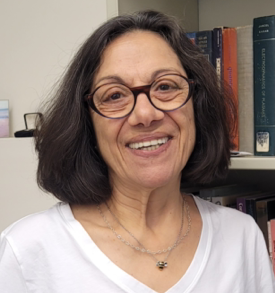Haydee Salmun
Professor of Earth and Environmental Science
Contact:
Email: hsalmun@hunter.cuny.edu
Phone: 212-772-5224
Office: 1041 HN
Biography:
Prof. Salmun’s interests are in the areas of environmental fluid mechanics, climate dynamics, oceanography and coastal processes. Her research concentrates on understanding and modeling processes, particularly as applied to interdisciplinary aspects of atmospheric, marine, and environmental sciences. Prof. Salmun served as the Undergraduate Adviser for the Environmental Studies major since it was approved (2001) till recently, and with colleagues helped create the curriculum. She continues to update it and has developed new courses for the major, such as Advanced Oceanography, and Introduction to Fluid Mechanics, offered with the Physics Department. Prof. Salmun was the director of the The Catalyst Scholarship Program at Hunter College, has taught courses in the Hunter Honors Program and is a member of the faculty of the Earth and Environmental Science Ph.D. Program at the CUNY Graduate Center. She was a member of the NASA PBL* incubation Study Team that produced the 2021 NASA PBL Study Team Report, and is currently part of the Editorial Board of Advances in Meteorology,
* Planetary Boundary Layer
Education:
Ph.D. 1989 The Johns Hopkins University, Department of Earth and Planetary Sciences M.S. 1980 University of Missouri-St. Louis, Department of Physics B.S. 1977 University of Buenos Aires, Departamento de Fisica
Research & Teaching Interests:
Environmental fluid mechanics, climate dynamics and climate change, oceanography and coastal processes, land surface-atmosphere interactions, mathematical modeling of geophysical flows. The overall goal of my research is to understand the effects of small-scale processes in geophysical and environmental fluids on the large-scale flows and their variability.
I continue to teach and to develop new courses in relation to my research interests. In addition, I want to teach courses that focus on interdisciplinary education, for example, courses that teach the physical and mathematical basis of the Earth’s climate and global climate change and that also include the need to understand the far reaching implications of this change for humans.
My interest in, and commitment to, issues of gender, diversity and inclusion in science continue to provide incentives for mentoring students in the sciences as well as teaching about the role of women and minorities in STEM disciplines.
